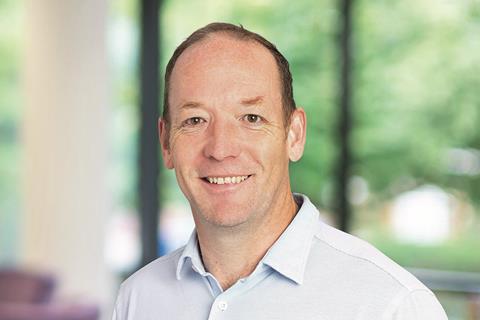Pete Redfern claims Grenfell Inquiry proceedings reveal role of government as negotiations with housebuilders over £4bn cladding bill continue
The outgoing chief executive of Taylor Wimpey believes the government shares the moral responsibility for the cost of sorting out the post-Grenfell fire safety crisis.
Pete Redfern told Housing Today, Building’s sister title, that the industry accepted that it needs to go beyond its strict legal responsibilities in paying for the repair of housing blocks now deemed to be unsafe. But information emerging from the Grenfell Inquiry shows that the government should also accept its share of the cost.

Redfern (pictured, left) said the extent of the ask on the housebuilding industry – which housing secretary Michael Gove has called upon to contribute a further £4bn on top of around £4bn of existing contributions to remediation efforts – did not feel “reasonable”.
The past week at the inquiry has seen former officials defending the apparent failure of the government either to alert the industry or reform regulations in response to a series of failed fire safety tests on cladding materials from as far back as 2001.
The coming weeks at the Inquiry are likely to hear further cross examination of the government’s much criticised failure to reform fire safety guidance in the wake of the 2009 Lakanal House fire, despite a recommendation by the coroner.
Redfern said: “I do think it’s important that the industry stands up and says there are moral arguments as well as pure legal ones. We [Taylor Wimpey] have never sort of fallen back on the argument this is just about whether it’s legally right or not, there is a moral responsibility there as well.
“But government shares that moral responsibility. Going back to the regulatory system and everything else, there are clear things coming out of the [Grenfell] Inquiry, which, [have] increased that awareness.
“There are large groups of people that need to play their part. And I do feel that just because, you know, publicly listed housebuilders are visible, it’s not right to see them as the only possible source of a solution for these problems.”

Taylor Wimpey has already set aside £165m to pay for cladding repairs, with the industry as a whole claiming to have allocated £1bn to fix problem blocks. Developers are also about to start paying the new Residential Property Developer Tax, which the industry estimates will raise £3bn over the next 10 years.
Redfern, who is due to step down from Taylor Wimpey later this spring, said it was right to expect companies in the industry to go beyond their legal responsibilities, but the extent to which they were being asked to do so was “unusual” and like “expecting Shell to pay for BP’s oil spill”.
“Some of the things that are being asked for go further than is normal or feels reasonable”, he said.
Redfern told analysts yesterday that he was still hopeful that negotiations with government will significantly reduce the current £4bn price tag on the contribution asked for by the housing secretary. Redfern said the work housebuilders were doing themselves on their own buildings, plus a more accurate assessment of the number of buildings needing work doing would reduce that number.
The Home Builders’ Federation claims that less than half of the buildings which need repairing were built by UK housebuilders, and has commissioned a big four accountant to undertake a more detailed analysis of the number of properties and who was responsible for developing them.
Redfern did not set out a specific alternative figure, but said: “We can’t get anywhere near the number of buildings requiring remediation that the government has got, which gets them to the £4bn figure.”
He also told analysts that he was not convinced that a roof tax, or new levy, was necessarily going to be the outcome of the negotiations with government, as predicted by Persimmon chief executive Dean Finch on Wednesday. “We cannot give a prediction [on the outcome],” he said. “We’re very much in the thick of it.”
Redfern made his comments after Taylor Wimpey yesterday reported full-year results for 2021 showing turnover up 53.6% to £4.28bn and profit up to £680m. Redfern is to be replaced by Jennie Daly, the firm’s group operations officer.



























No comments yet